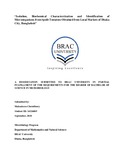Isolation, biochemical characterrization and identification of microorganisms from spoilt tomatoes obtained from local markets of Dhaka city, Bangladesh

View/
Date
2018-09Publisher
BRAC UniversityAuthor
Chowdhury, MahzabeenMetadata
Show full item recordAbstract
Tomato is a fruit which has high nutritional value along with uses in different dishes. This study aimed at isolating, identifying, and investigating enzyme activity and temperature tolerance of bacterial isolates collected from spoilt tomatoes of different markets of Dhaka city, Bangladesh. Six samples (1gm) of spoilt tomatoes collected with sterile knife and mixed with 5ml of saline and then cultured on various selective media. Identification of bacteria was done through conventional biochemical tests according to Bergey’s Manual of Sysmetic Bacteriology. Temperature tolerance at temperatures (4oC, 25oC and 60oC) of isolated bacteria were observed. Cellulose hydrolysis test was also performed using CMC Agar. A total of about 46 bacterial isolates were identified where Vibrio spp showed the highest prevalence 9 (19.56%), followed by E.coli 8 (17.39%), Klebsiella spp 7 (15.22%), Salmonella spp. 6 (13.04%), Bacillus spp. 6 (13.04%), Shigella spp 5 (10.87%), Staphylococcus spp. 3(6.52%) and Enterobacter spp. 2(4.65%). Temperature tolerance of bacterial isolates showed that all of the isolates were mesophiles and could not grow at temperatures of 4oC and 60oC. Cellulose hydrolysis test revealed that Klebsiella spp, Shigella spp, and Salmonella spp were able to hydrolyse cellulose. However, E.coli, Vibrio spp, and Bacillus spp, were not able to hydrolyse cellulose. These results indicate that spoilt tomatoes contain bacteria with ability to cause foodborne illness.
